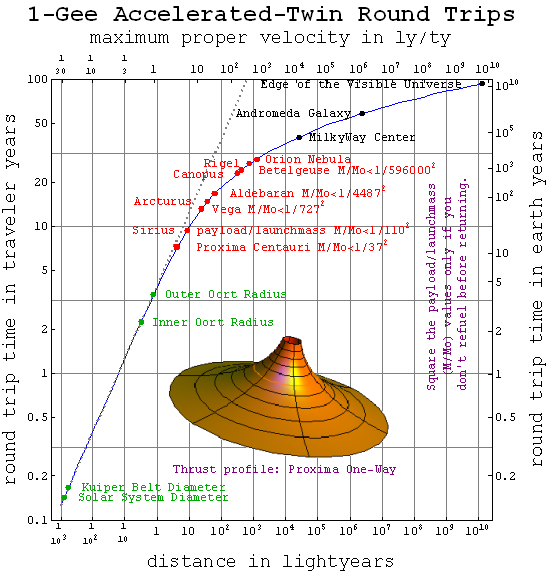Ann wrote: ↑Tue Apr 28, 2020 4:46 pm
Chris Peterson wrote: ↑Tue Apr 28, 2020 1:43 pm
sillyworm 2 wrote: ↑Tue Apr 28, 2020 1:35 pm
Chris, One can only wish and hope.One of the exoplanets I researched would take a ship,at light speed,734,000 years.
The point is, the amount of time it takes from the perspective of those on the ship can be arbitrarily short. It may take a ship 734,000 years to reach another star from the perspective of those on Earth, but it could take just hours from the perspective of those on the ship. Welcome to special relativity!
I understand the concept of time dilation, but I have a number of questions nevertheless. In order to achieve significant time dilation and make the journey reasonably short, it will be necessary to accelerate the ship to high speeds. Clearly the time of acceleration can't be arbitrarily short, because the human body wouldn't be able to tolerate it. Or perhaps you mean, Chris, that no humans would be on board this ship, only machines?
Certainly there are practical limits on acceleration set by human physiology. The greater the distance you travel, however, the greater the benefit from time dilation and constant acceleration. At 1G, it would take 4 years to travel 4 light years (half of the time accelerating at 1G, half of the time decelerating at 1G). At 2G, it would take 2.8 years. Humans might be able to deal with 2G for that long... or not. But suppose you want to go 100 ly? At 1G, you can do that in just 19 years (again, acceleration then deceleration). 19 years ship time, over 100 years Earth time.
It has been proposed that it would be possible to build huge cosmic "sailing vessels" that would use, among other things, the solar wind to accelerate. Clearly this sort of acceleration would be very slow, and it seems to me that it would take far more than a human lifetime to gain enough acceleration to clear the Solar system by this means.
Yeah. Not a method to use if you want to get somewhere fast.
In order to gain reasonable acceleration, it would be necessary to bring, I would think, huge amounts of fuel. Or do we foresee the invention of "dilithium crystals" similar to the kind they use in Star Trek, that can accelerate a ship quickly and easily to speeds faster than light?
The amount of energy is large, but not in comparison to what is theoretically possible if you could efficiently convert mass to energy according to E=mc
2. This is an engineering problem, not a fundamental science problem.
In order to achieve significant time dilation, it would be necessary to move at a significant fraction of the speed of light. But space isn't empty. Colliding with high energy cosmic particles at a significant fraction of the speed of light, and colliding with dust particles and tiny particles of cosmic debris, would in all probability be very bad for the integrity of the spaceship. How do we protect the ship from turning into a spaceship variety of Swiss cheese because of all the collisions with "cosmic grains of sand"?
A serious problem. But again, an engineering problem more than anything.
 The Kepler-90 Planetary System
The Kepler-90 Planetary System
